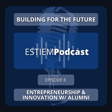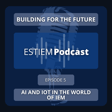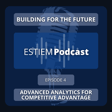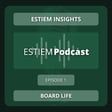Become a Creator today!Start creating today - Share your story with the world!
Start for free
00:00:00
00:00:01

Building For The Future | LSS Black Belt Course
ESTIEM just finished an LSS black belt course. So we are asking: Are you in love with Lean Six Sigma? Do you want to know if getting the black belt is worth it? How is it's course compared to a green belt course? How is it like to earn the belt? If you are curious for these questions, this episode of ESTIEM Podcast has perspectives from organization and graduates' side for you to confidently draw your LSS path!
Transcript
Introduction to Esteem Podcast and Guests
00:00:04
Speaker
Thank you.
00:00:18
Speaker
Hello people from the IEM world and welcome to another episode of Esteem Podcast. I am Umut, your host, and I will be interviewing Jukkis, a creator of the course, and Jakov and Jose, who are graduates from the course.
00:00:31
Speaker
So before we begin, could you guys please introduce yourselves? Let's start with Jukkis.
Jukkamatti's Background in Lean Six Sigma
00:00:37
Speaker
hi it's great to be here. My full name is Jukkamatti Turretiainen, which really doesn't matter, ah but I come from Finland.
00:00:47
Speaker
I studied in Lappeenranta, spent more time in Helsinki, actually, because we were developing the Lean Six Sigma Greenbelt course with Mikko and Henry and others.
Jakov's Lean Six Sigma Journey
00:00:59
Speaker
Hi, everybody. My name is Jakov. um I was member and I'm still still a member of Local Group Zagreb in a STEAM. Joined the STEAM 2019, also the year when I attended my Greenbelt course.
00:01:14
Speaker
Right after that, I continued somehow my Lean Six Sigma journey with the central team and then doing a bunch of instructing later on. In my professional life, I work in automotive sector as as a tier one battery supplier production engineer for for high volume battery production. And yeah. yeah Since I was highly involved in a Greenbelt course with instructing, logical next step was to support the team to to join as participant and hopefully later in the future as an instructor as well.
00:01:47
Speaker
I give my word to Jose.
Jose's Role and Studies in Lean Six Sigma
00:01:49
Speaker
Hi everyone. My name is Jose from LG Cartagena. I joined this team and also I was co-founder of my LG three years ago.
00:02:01
Speaker
and Two years ago also I took my Lynx and Sigma Greenbelt course and I then worked one year as a continuous improvement engineer in a metal manufacturing company doing my LSS Greenbelt and after that working as a Continuous Improvement Engineer.
00:02:23
Speaker
And right now I'm studying full-time an MBA. And I took also the Black Belt course recently.
00:02:34
Speaker
Okay, perfect.
Development of Lean Six Sigma Courses
00:02:36
Speaker
First of all, I want to ask, what are the objectives that drove the design of the Black Belt curriculum? curriculum Well, we were actually designing or developing the STEAM Lean Six Mac Green Belt course with Mikko and Henry from Helsinki.
00:02:50
Speaker
Since the beginning, almost, people were asking that they should there be a, or will there be a black belt course that has been in the air. And we have tried tried it once before with the Continual Improvement Development Specialist Program.
00:03:05
Speaker
And as the name says, it it was a bit complex thing to execute. But basically what we have done is we have integrated the learnings with Mikko.
00:03:15
Speaker
from Craig's teaching from Black Belt Course, which we went when we developed the Green Belt Course. And then we were at the Master Black Belt Course in 2017, if I remember right.
00:03:28
Speaker
And then during and after Corona, we got together with Mikko and talk about different things we faced in our work from different in different companies and what kind of mental models would be helpful and how the Black Belt Course stuff comes together.
00:03:46
Speaker
And then we wanted to do something useful for IEM people in general in order to develop this sort of common course which is aimed to be the help people to be better better in solving problems and in improving processes and bringing strategy on the action.
Structure of Greenbelt and Black Belt Courses
00:04:05
Speaker
So you're saying everything started from the Greenbelt course? Yeah, so nowadays I guess there are over 2,400 people going through it. The structure of the Greenbelt course is so that there are about 80 videos from Gregory Watson.
00:04:22
Speaker
And then there is practical sessions which are then led by students, which are instructors. And there is like teaching of the theory conduct from the videos and then re-forcing the the teachings at the practical sessions.
00:04:38
Speaker
And we had a bit similar. approach for the Black Belt course that we have ah people who have gone through Black Belt course. And I want to ask one more organizational question.
00:04:49
Speaker
How do you identify and select candidates for the Black Belt program? Do you have prerequisites or some training that you require? That's a topic which we discussed quite a lot in the beginning.
00:05:03
Speaker
And we decided that we we don't have a prerequisite that person needs to go on through the Greenbelt course. If the person has graduated from IEM program, so they have some work life background in that sense, or the person has a Greenbelt certificate in order to get this hands-on experience, how how processes work and how those can be improved. And then we are prioritizing people with the instructor background. Then we are testing a bit that if a person hasn't done a Greenbelt project, can they still come to the course with an instructor background? I myself actually attended the Blackbelt course
00:05:46
Speaker
After attending the a commercial Greenbelt course, I hadn't completed my project because I had some different viewpoints of what what I should do in the project. So I went then to Craig's Blackbelt course I see. I hope we can see you in future projects as well.
00:06:03
Speaker
Let's put other participants in the
Tools and Frameworks in Lean Six Sigma
00:06:05
Speaker
conversation as well. And let me ask you, which Lean Six Sigma tools and frameworks received the most emphasis in the training and what could stay in your mind during the training that felt like the most impactful in your work?
00:06:20
Speaker
So I would say, and maybe my colleagues can later agree. So Greenbelt level was more about the tools itself. and showing the basic framework.
00:06:31
Speaker
And then the black belt expands the framework to multiple solutions. um And basically we introduced a couple of new phases as well. One of the the most important ones was the recognized phase where we actually defined the potential of the problem that we are trying to solve or that we would like to solve and then to find ideal project solution fit um for that problem.
00:07:01
Speaker
So that was the most memorable thing for me. yeah For me, it was mainly focused on practical application and the difference between green level and black level. i would say that this and the black level is more ah business oriented and also and it focuses more on the not only project planning, but connecting all the improvement initiatives with the performance in the end.
00:07:30
Speaker
And also and the main difference also for me has been the the depth of the topics. And also it was really interesting to to talk and also to discuss with people that also have been in this world of continuous improvement and quality, and the way they do things and how you can improve the way you actually do these type of projects.
00:07:53
Speaker
at the That's very interesting to hear from the participants. perspective that what what you were how you now see what what was the difference and importance of different things so as jacquard mentioned we added the recognized phase you which is not that widely thought of the lean six sigma usually it's just about the mic defined measure analyze improve control and with the recognized phase the aim is to connect it more on the strategy of the company and bring in the management attention.
00:08:27
Speaker
We also bring in different tools from example ah from design thinking that kind of widens the perspective of the course that it's just not only narrowing on the statistical tools and some qualitative So what was the biggest obstacle you faced during the Black Belt project and how did you overcome it?
Challenges in Black Belt Projects
00:08:53
Speaker
Maybe we can start with Jose. Okay, so and last year I took Black Belt, but it was a commercial one, not a Steam one. And one of the biggest challenges that I had was that being young and proposing changes to experience teams was no not so easy.
00:09:13
Speaker
And when I was suggesting new ways of doing things to people who had been there a lot of time, it was difficult. But to overcome that, I focused on building trust, also to listen carefully and to involve all the people in the in the decisions and in every small thing.
00:09:32
Speaker
But once they started to saw the results, they started to believe that the project was was good also for them. So I think that that this part is one of the most difficult for everyone. um From my side, um i'm i let's say, I just defined fully the project between my organization and started slowly to to work on it.
00:09:56
Speaker
um I had a different case. and Basically, my project developed out of organizational needs, so I didn't have challenges like explaining to the organization why that is a necessary approach that we need to overtake. But what I'm already feeling now, as my a project will involve a lot of organizational changes for the manufacturing process, let's say full rebalancing of the high volume production line, people don't like changes.
00:10:25
Speaker
And if you're trying to impose a change in somebody's work, that's the the biggest challenge that I have at the moment, basically explaining them why this change is actually helping them and of course designing the change that is going to happen with them.
00:10:41
Speaker
So these are the the moments, the key obstacles for me operationally.
00:10:49
Speaker
Yeah, well, I can share a story. It's not from a black belt project as such, but when I come came to Finland from Germany, i was working at Continental as an intern for the head of,
00:11:01
Speaker
corporate quality environment. I was used to to that to send just an email and then within a day or or two, the business unit quality directors or however they were, the people responsible for the quality of the business unit, it they were answering to me. And the same was at the hospital when I was saying that yeah my project sponsor is the head doctor of the hospital and people were paying attention to what I was asking from them.
00:11:30
Speaker
But then I came to a factory in Finland and remember asking that, hey, I would need this data from another department. And but then after a week, I didn't get an answer to my email.
00:11:44
Speaker
And I was like, yeah, what should I do? And the the the best approach I came up with, I needed to find out the guy and go and ask him straight away that, hey, you know,
00:11:58
Speaker
I would need a bit of help with this and I'm doing this and on and and so on. So building these connections like in in real life and getting people on board that, hey, what I'm doing and who am I and and and so on.
00:12:12
Speaker
I see. When you're not getting responses to your emails, especially when they are urgent, finding somebody to respond to them is always a stressful thing.
00:12:22
Speaker
It's a good thing that you were able to overcome it. I also want to ask...
Value of Instructing Lean Six Sigma
00:12:28
Speaker
Why would you think it would be a good idea to instruct or study Lean Six ah Sigma as a student or as a professional?
00:12:36
Speaker
As it comes with every skill in life. I mean, um after you attend a course, you just got, let's say, brief grasp on all the topics.
00:12:47
Speaker
Let's say, even even if you attended the course twice. But only after you put yourself into the perspectives, okay, now I need to hand over this knowledge or explain this concept that is understandable for me in my head to other people in front of me, I would say that's when the ah real learning kicks in.
00:13:05
Speaker
So I always encourage my colleagues to, after they attended the Lean Six Sigma course, whether it's a green belt and now in the future, the black belt, to instruct because also there is a bit of giving back to the community which is very important in this team and overall.
00:13:24
Speaker
And also you are developing more as a professional after you hand over the knowledge to others. So that's what works for me.
00:13:37
Speaker
and for For me, i would say that it's also a good thing to to share with the community all the the knowledge about leasesim or continuous improvement that you have. And also, i think that it's a good way, i mean, teaching and instructing, a good way of consolidating the knowledge that you that you have, because usually in the courses, you are going you're going to get asked yeah about ah about everything and from different point of views.
00:14:06
Speaker
So you are going to think about every tool, every thing that you want to to teach and you are going to to think more about these topics and also um in different ways. So it's a way to consolidate also the your knowledge.
00:14:29
Speaker
I fully agree. And we had and have had a lot of fun while instructing and not really being able to know what all kinds of questions people are going to ask and whatnot.
00:14:43
Speaker
It has kind of built this sort of resilience towards the unknown. And on the other hand, why it's good to learn about Lean Six Sigma.
00:14:57
Speaker
I remember Craig saying at some point that the He likes to solve problems and that there is no problem he cannot solve. And I was like, OK, what do you mean?
00:15:10
Speaker
But after being in Africa and teaching quality and Lean Six Sigma and stuff over there, I had this confidence or I was reflecting that, hey, you know, no matter what type of problem I'll be facing to be solved in work life or especially in work life and organizations, you know
00:15:35
Speaker
I have this idea that, hey, what type of questions do I need to answer? And with those questions, I need to collect some data, and then the data will well go give answers.
00:15:51
Speaker
that That was like a very interesting moment to realize. Doesn't work that well, perhaps, in works in personal life, that that sort of data-driven approach, but at least with processes to some degree.
00:16:08
Speaker
It is definitely important to be open to learn how to do things, and then after you have mastered a craft, then you should be able to confidently say you can solve a problem about that specific situation.
00:16:23
Speaker
And it's great to hear that you are also being confident in your field as well.
Career Impact of Black Belt Certification
00:16:28
Speaker
And now that you've finished the course, do you have any plans to implement your learnings to your working life?
00:16:34
Speaker
And could you tell me about what ways has earning your black belt changed your day-to-day work or even career trajectory?
00:16:44
Speaker
Well, I think it's interesting question in that sense, especially the ending of it that ah has earning a black belt changed your day to day work or career trajectory.
00:17:00
Speaker
With the green belt course, we had a bit the same thinking and and type of questions that how does it help? Basically, for some people who are entering the working life or are in a specific situation at the company that after going to the black belt course they can ask for a black belt project which means like cross-functional project in general which has management attention I remember a question was asked what's the most important thing in your career development and Christoph Haagedon answered
00:17:40
Speaker
to that question that it's visibility towards management. So in that sense, being able to get this sort of project and and show the the skills someone has can have a big benefit on the career path as as such.
00:18:00
Speaker
So maybe that's my take on the topic.
00:18:06
Speaker
Maybe to add on from my side. And especially I've witnessed that since I was involved from, let's say, really early, if we can call it career stage, but very early in life. So I was second years of studies when I completed the Greenbelt course.
00:18:25
Speaker
And um if you're trying to explain some quality topic to a management person and you don't have, let's say, the age that is backing you up,
00:18:37
Speaker
then in our case, the black belt definitely brings in more credibility to what you're saying, especially after you completed the the project. That's one one thing. The second thing, there are some industries where Lean Six Sigma is not only applied on a project level, but let's say on on an organizational, how the industry works. Those are very standardized industries such as aerospace, process industry, food industry,
00:19:06
Speaker
automotive industry, and then in that environment, just understanding why how the standards work, why these tools are used every day, and so on, also helps you in your career trajectory, um performing better in that sense, whether you're in quality, or you're in logistics, or you're in manufacturing, or production.
00:19:27
Speaker
So, yeah.
00:19:41
Speaker
So and I'm planning about applying these knowledge that I learned in the LSS Black Belt course. Not now, because I'm studying full time right now.
00:19:53
Speaker
But as Yuki said, I think that this type of pre Black Belt projects have more visibility and are going to to help you to back, as Jakob said, back you up when you are like discussing with people that have more experience or that have a much higher m organizational position.
00:20:19
Speaker
ah But I think that that the good thing is that you, okay, after taking the course, you know all the all these tools and also you are going to know how to manage all these cross-functional processes and so on. so this course kind of back you up in in front of the people that are taking the decisions that you know how to do it
00:20:47
Speaker
yeah maybe I could add on that that the depending on the country and the context there there is of course it varies but the discussion between what is Lean and what is Six Sigma ah and what is total quality management and and these different methodologies.
00:21:12
Speaker
ah After the Greenbelt course, at least some some people get this idea that Thalesic Sigma is ziig the best thing to do. ah and What we would like people to get or learn in the Blackbelt course is more holistic.
00:21:30
Speaker
way of of thinking that hey the RDMIC is like a project management methodology and then you can apply different tools depending on the pro project and the problem and the organization as well as the industry and the the the a having these different sort of management aspects like the three gembas as well as Mūrī, Mūrā, Mūda point of views try to emphasize this sort of holistic view on how to improve processes and organizations and prepare people to be better in having this sort of holistic view on things.
Future of Lean Six Sigma Training Models
00:22:23
Speaker
And would you say that we should talk about, since the course was almost three months, that it was exhausting to participate in a black belt course? We should not talk about that it was exhausting.
00:22:36
Speaker
We should which said ah talk about um maybe the approach people could take or consider when deciding to apply for the course. um It is quite a lot of stuff that we covered.
00:22:51
Speaker
um We had two sessions per week for two hours for around about 10 weeks. And then also we had one Saturday of four hours online contact session and introduction and two weekends.
00:23:09
Speaker
So three full days, two times three full days in person. And also on top of that, 400 videos on the online platform that we need to watch between two online sessions every week. So it was quite packed.
00:23:30
Speaker
And hence the, the old recommendations for the course, because there was a lot of course content that we covered a lot of wide topics that we needed to cover, but consider, you have the time?
00:23:46
Speaker
in this period when you are deciding to apply? Because you need to really dedicate the time to to maximize the learning out of this course. Yeah, from my point of view, as a person that right now is not working and only fully studying, I think that having the sessions in the afternoons and also in the weekends, also in the face-to-face sessions that we had in Munich,
00:24:14
Speaker
and I think that for people that are actually really interested in learning about these topics and if they have the time, I think that it's really, really valuable because you're going to interact with a lot of people that are also interested in the same topic, are working in the same thing, more or less.
00:24:36
Speaker
And yeah, it's a lot of work. But for me, I think that itly makes it makes a difference.
00:24:46
Speaker
And maybe from the organizational point of view, we are looking into different models, what what could make sense to organize it. that they The GreenBat course, there are this sort of two weekend small two weak models, then it's five day and some online pre-work.
00:25:09
Speaker
And ah those some courses are running at the local level, so hopefully we'll see. in the future, this sort of more regional slash country level courses where we are considering to have it over five to six months and one day per month as a face-to-face learning and so on.
00:25:35
Speaker
So not now the course model is pretty intense, but definitely you'll get a lot out of it.
00:25:48
Speaker
I do hope we can keep on having LSS courses and improving them. And it might be exhausting. It might not be for some people, but definitely there is a lot of work put in to get the black belt. And this is what differentiates someone who has a black belt and someone who does not.
00:26:09
Speaker
and Maybe actually something to add is that those videos are available for people for three years at least. And the those are something to go back into while doing the project. And especially there is a possibility to be a bit selective at ah out of all the videos which you watch, which are relevant to your industry at the moment and your project.
00:26:34
Speaker
Yeah, that's also something that differentiates.
Growth of the Lean Six Sigma Community
00:26:38
Speaker
All right. So is there a community around Lean Six Sigma? And would you like to see it grow in the future? For sure there is. I mean...
00:26:47
Speaker
From back in the day when I started, it wasn't definitely in the form and number there the that is now. But nowadays we have the the big channels on the WhatsApp group that are really getting active and they're, let's say, is trying to streamline a couple of topics.
00:27:06
Speaker
One are, I don't know, Lean Six Sigma best practices that we can share between each other. Then there's just a Q&A group for the people that are either doing the project or have um troubles defining their project. So they refer to seniors as Yukis and Martijn and others for help. um There are also instruction instructor possibilities for guys.
00:27:31
Speaker
um So I would say overall there is um community in a formal way, for sure in Lean Six Sigma, but also in informal way. um I know when there was a five-year anniversary, we organized the event in Helsinki.
00:27:46
Speaker
We invited the Greg and basically just celebrated the fact that five years have passed and for the course.
00:27:58
Speaker
So I would say for sure. Yeah, but for sure. there There is a community. For me, it was really nice to see all these people in the in the Black Belt project that have a lot of experience in their in their in their work life and also that have instructed a lot of times LSS Greenbelt, like for example, Jacob.
00:28:20
Speaker
and And also, of course, Yuki, that was also one of the creators of the um the course. and I think also that there are of things that could be also ah implemented in the LSS community, like and like mentorship, for example, for people like me, that we are and between the green and the black level.
00:28:43
Speaker
It would be like really really interesting to to help people that are starting with their project in the green belt. And also, it would be nice to establish some kind of mentorship but for the people that that they are stuck with their with their project. So that they both people, the one that is stuck and doesn't know how to how to follow, and the other one, that the people the people or the person that hasn't got that much experience can also take advantage of of learning new new i mean new ways of managing a project and also implementing LSS.
00:29:29
Speaker
Maybe some graduate in the future will hire some interns to do a project as well. the It's interesting that last in 2024, there were, of I think, 440 students go going through the Greenbelt course.
00:29:51
Speaker
And that's a bigger amount of people than there are in CEM. So if if they haven't grown a lot ah or at least a bit since my time.
00:30:02
Speaker
But how to build this community more? And how can we learn from each other even more in the future is definitely something interesting.
00:30:14
Speaker
And I hope hope that this sort of community sharing and learning will grow in the future. And that was it for today. Thank you for listening to this episode of Estim Podcast.
00:30:26
Speaker
Make sure to implement LSS principles to your working life and see you somewhere in Europe.



















